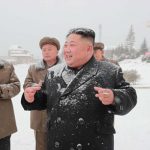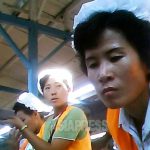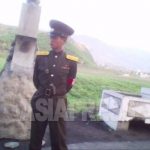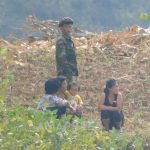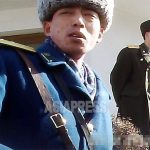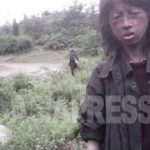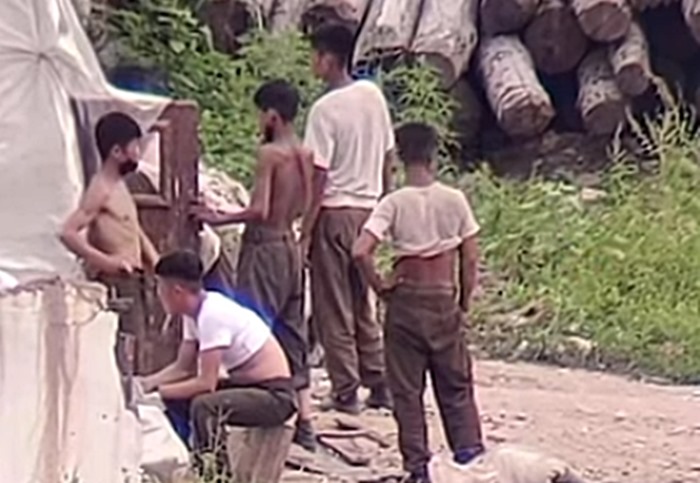
ASIAPRESS continues to receive reports from various areas of North Korea about a dramatic rise in starving soldiers due to reduced supplies of food to military bases. The source of these reports about conditions inside isolated military bases are soldiers who have been sent home due to malnutrition. ASIAPRESS conducted a survey about conditions at the bases in the northern part of the country in mid-September. (ISHIMARU Jiro / KANG Ji-won)
◆ Starving soldiers are sent back home
Recently, the government’s strong efforts to restrict interaction between soldiers and civilians have made it difficult to understand the situation inside military bases. ASIAPRESS reporting partners met with soldiers who had been sent home due to malnutrition to get a better handle on the realities of starvation inside the military.
A reporting partner (“A”) in Yanggang Province told ASIAPRESS the following:
“There’s been an increase in soldiers who have returned home due to malnutrition. Most are relatively new recruits who entered the military not more than two years ago. I talked with a young soldier who returned home to a neighbor of mine after a stint at a base in Wonsan, Kangwon Province, and he said that he ate two meals a day at the base, and on days with no lunches, the authorities skipped afternoon training and had the soldiers take afternoon naps instead.”
Another reporting partner (“B”) in North Hamgyung Province who talked with a soldier told ASIAPRESS:
“There are three young people suffering from malnutrition who were discharged for medical reasons in my inminban (neighborhood watch unit) alone. There’s probably more coming home (for medical reasons) than being dishonorably discharged.”
※ Inminban are North Korea’s lowest administrative unit and are typically made up of 20-30 households each.
※ Soldiers who are considered medically unfit to continue military service due to disease, injury or malnutrition are discharged under a system called “gamjongjaedae.” Soldiers punished for violence, criminal activity, or violating military discipline are discharged under a system called “saenghwaljaedae.”
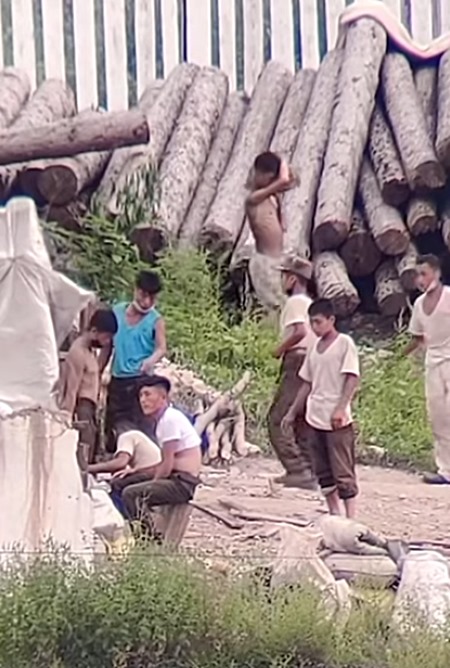
◆ Soldiers unable to take part in farm mobilizations due to malnutrition
“B” told ASIAPRESS more about what he heard from the soldier:
“The young person who I spoke to spent a year and a half at a base in Jajupo, North Hwanghae Province, and recently returned home after being discharged for medical reasons. The base’s meals were just salt and corn, not even totaling 400 grams per day. He told me that ‘there were three meals a day, but they amounted to was just one meal being divided into three meals.’ The soldier also said that he was unable to taste even one drop of (cooking) oil this past summer, and that there was such an increase in staggering soldiers that nobody could be sent to work at farms during the summer.”
In principle, the military sends soldiers suffering from malnutrition and who are in need of medical treatment to military hospitals. It is illegal for soldiers to be admitted to a local hospital for treatment upon return home. How, then, are returned soldiers’ parents providing medical care to their sons?
Another reporting partner in Yanggang Province (“C”) told ASIAPRESS the following:
“Soldiers can’t return home just because they are in need of medical treatment for a disease. Most young people who have returned have been temporarily discharged for medical reasons. Parents with some money bribe hospitals to get a document that confirms their sons need to be treated at hospitals. The hospitals then inform the military bases where the soldiers came from (about the hospital admission).”
◆ Why are soldiers starving during the harvest season?
Soldiers suffering from malnutrition in North Korea is not a new problem. Many defectors who served in the military have testified about the lack of food supplies at military bases since the early 1990s. When ISHIMARU Jiro was reporting on conditions inside North Korea in July 1993 and December 1994, starving soldiers even demanded food from him.
There are three broad sources of food supplied to the North Korean military.
1. Some of the harvests of collective farms are sent to military bases. This food is referred to as “military rice.”
2. Food imported from abroad.
3. Corn and vegetables cultivated by soldiers in fields near military bases. These fields are called “buopji.”
※ In the spring of this year, the Kim Jong-un regime ordered all military “buopji” to be combined with the fields managed by collective farms, although it is unclear how many of the military-run farm fields are actually under management of collective farms.
Most of the food supplied to the military ----. In short, the food has been acquired systematically by the government. The government, however, has failed to obtain enough to feed soldiers, which has led to chronic levels of malnutrition in the military.
Presently, the harvest of North Korea’s main staples – corn and potatoes – has finished, so why is food failing to get to the military?
Starting in around April of this year, the North Korean government failed to acquire enough white rice and corn to be sold at state-run food shops, so it turned to military stores of food to supply the shops to quickly resolve that urgent problem. The sale of food at markets was banned in January, so the government was unable to stop the sale of food at state-run food shops. The government continued to siphon off military stores of food for civilian use up until June. The impact of all this is that soldiers are suffering from starvation, which has led to a rise in crimes committed by soldiers.
ASIAPRESS was unable to uncover whether the scale of the food shortages at military bases is nationwide or not. (End of series)
※ ASIAPRESS communicates with reporting partners through Chinese cell phones smuggled into North Korea.
- <Inside N. Korea> New proclamation calls for intensified control over the economy…Intense crackdowns on circulation of goods and use of foreign currency (3) Proclamation reveals Kim regime’s anti-market policies…government crackdowns down heavily on private economic activities
- <Inside N. Korea>Government calls on people to “repay the Supreme Leader’s hard work” during Kim Jong-un’s visit to Russia and mobilizes people for farmwork and construction projects
- <Inside N. Korea> People increasingly interested in Kim Jong-un’s daughter following continuous appearances in state-run media…Several people investigated for claiming that “the era of a female Supreme Leader has arrived”
- <Inside N. Korea>Kim Jong-un orders start of operation to eliminate private medical activities, with a “secret vote” leading to arrests…The state also aims to revive its control over the medical sector
- Who is starving in North Korea in 2023 and why? Analyzing the situation through Amartyra Sen’s theories on famine ISHIMARU Jiro
